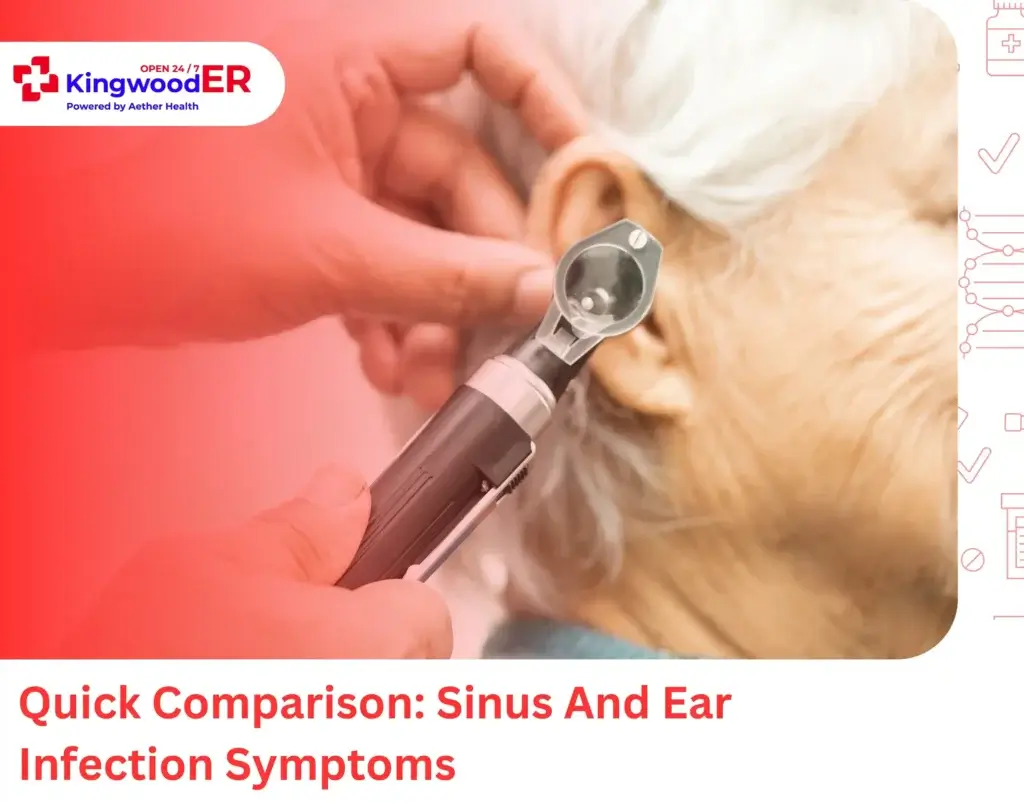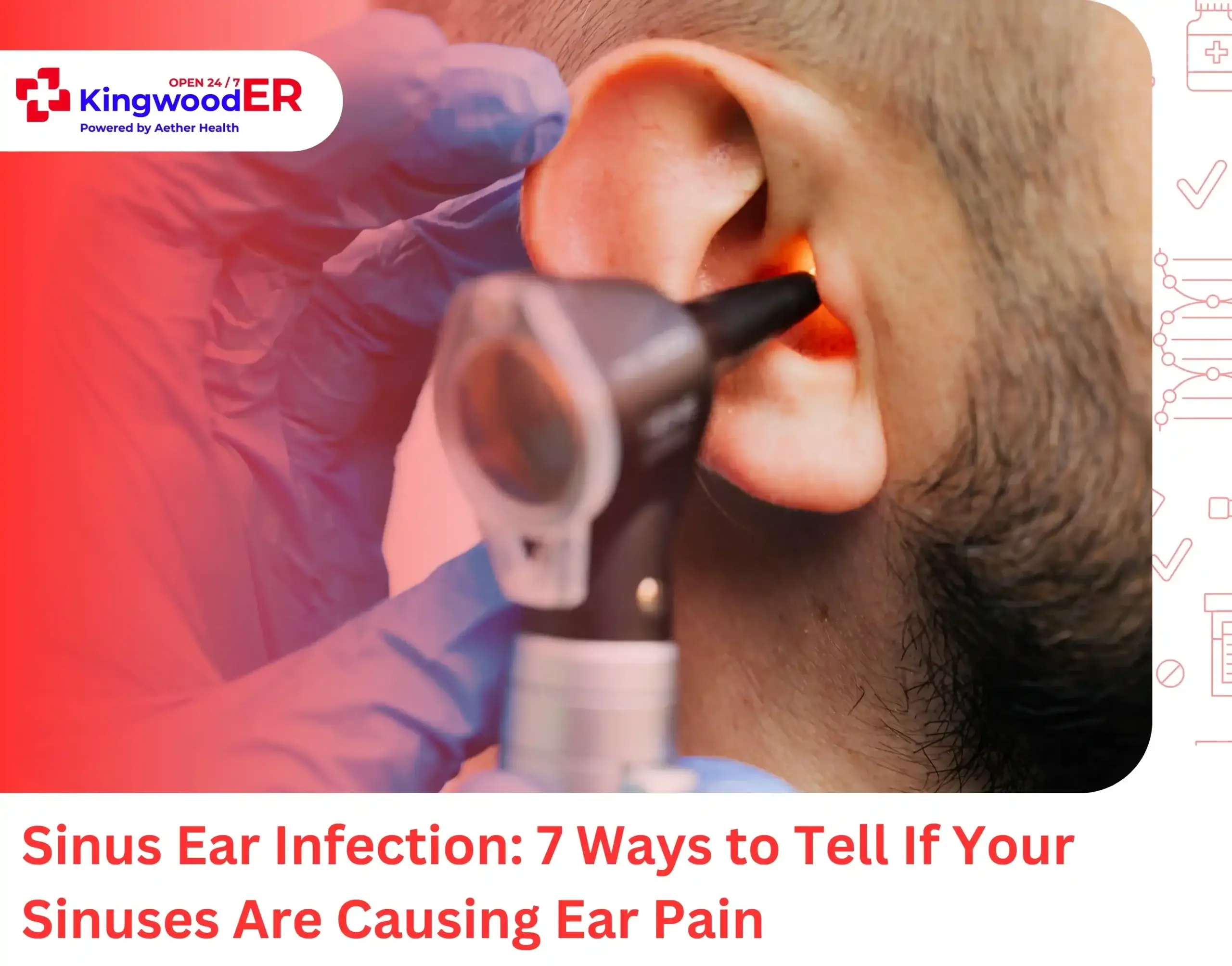Your ear hurts but ear drops don’t help. Why? The pain may actually start in your sinuses.
Your ears connect to your sinuses through a small passage called the Eustachian tube. When sinuses get inflamed during infection, these tubes get blocked. The pressure builds up and your ear becomes tight or painful. This kind of problem is often called sinus ear infection.
Many patients suffer through the spring allergy season with this exact problem. The usual ear treatments fail because they target symptoms, not the source. This blog uncovers 7 signs of sinus ear infection, so that you know whether your ear pain is caused by sinusitis or if it’s an actual ear infection.
7 Ways to Tell If You have Sinus Ear Infection

Here are seven simple ways to tell you have a sinus ear infection:
1. Pressure Behind Your Eyes, Nose, and Ears
A classic sign of a sinus infection is pressure around your eyes and nose. That pressure can push on your eardrums, leading to earache sinus that feels deep inside your ear.
2. Ear Feels Like You’re Underwater
The eustachian tubes are filled with fluid and block the usual airflow. In sinus ear infection, you have that underwater sensation due to trapped pressure.
3. Stuffy Nose and Facial Congestion
A plain ear infection doesn’t come with significant nasal symptoms. So if you have earache alongside a stuffed-up nose, facial pressure, and nonstop drainage, that’s a big clue you have a sinus ear infection. This condition is common around seasonal shifts when the pollen goes wild.
4. Pain Gets Worse When You Lie Down or Lean Forward
Try bending down to grab something or lie flat on your back. If the pressure in your face and ear suddenly spikes, that’s sinus ear infection. Why? Because fluid shifts with gravity. And when your sinuses are full of gunk, bending increases pressure.
5. No High Fever
Ear infections, especially bacterial, often cause a fever. But if you’ve ear pain without a high fever and all the sinus symptoms, it could be a sinus ear infection.
6. Earache Came After a Cold or Allergy Flare-Up
Sinus infections don’t usually appear out of nowhere. They tend to follow a lingering cold or seasonal allergies that hit Kingwood hard during cedar and oak pollen seasons. If you just got over a bad cold and now your ear hurts and your face feels tight, it’s probably a sinus ear infection. The inflammation from sinuses doesn’t always stay put; it travels. So It’s likely sinusitis making its way into the ears.
7. Pops or Crackles in Your Ear
Every time you yawn, chew, or swallow, your ear makes little pops or clicks. That’s your Eustachian tube trying to balance the pressure between your nose and ears. It’s harmless, but another clue that you have sinus ear infection.
8. Pus
If you notice pus leaking from your ear, it is not a sinus infection. When you have an ear infection, thick, yellow, or white pus may form. In severe cases, it drains out of the ear. Sinus infections make mucus instead of pus that blows out through your nose or drips down the back of your throat.
Quick Comparison: Sinus And Ear Infection Symptoms

| Symptom | Mostly Sinus-Related | Mostly Ear Infection |
| Facial pressure | Yes | No |
| Stuffy nose | Yes | No |
| Fever | No | Yes |
| Sudden, sharp ear pain | No | Yes |
| Hearing crackles or pops | Yes | No |
| Drainage from ear | Rare | Can happen if eardrum bursts |
When Sinus and Ear Pain Needs Medical Attention

The connection between your sinuses and ears explains why treating just one area often fails. Recognizing these signs helps identify whether your sinuses cause your ear pain, but proper diagnosis matters most.
Don’t rely on home remedies to treat your sinus ear infection. No matter how well you know about the signs, getting a quick checkup is essential to rule out any health risks.
FAQs
1. Does sinus infection cause ear pain?
Yes, your sinuses and ears are connected, so when your sinuses get blocked or swollen from an infection, the pressure can spread to your ears. This can make your ear feel full, stuffy, or painful. It’s not an ear infection, but the pain can feel similar.
2. When should you see a doctor for a sinus ear infection?
If your ear pain sticks around for more than a few days, or if you start feeling dizzy or unsteady, it’s time to visit the ER for sinus ear infection. Trouble hearing from one or both ears is also a sign that something may not be right. And if you’re running a fever or your symptoms seem to be getting worse, don’t wait it out.
3. Can a sinus infection turn into an ear infection?
Yes, a sinus infection can turn into an ear infection, if it isn’t treated or gets severe. The trapped fluid in sinus infection creates a perfect environment for bacteria or viruses to grow. This can lead to an ear infection (otitis media). A sinus infection may also lead to bronchitis and other health issues if not treated on time.




